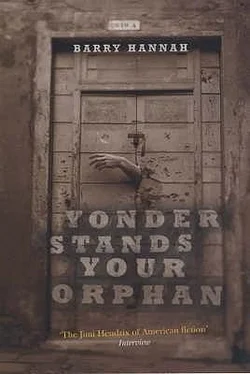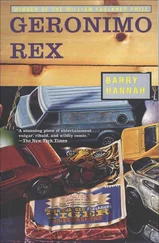Scores of corpses rested below the lakes, oxbows, river ways and bayous of these parts, not counting the skeletons of Grant’s infantry. The country was built to hide those dead by foul deed, it sucked at them. Back to the flood of 1927, lynchings, gun and knife duels were common stories here. Muddy water made a fine lost tomb.
It was just seven years ago Egan had been the driver who felt silent forms in the car seats beside him wanting to scream and party. When the car went under, he loved even the sweat on his brow. Done. The Christian antiapotheosis. Now , he said, let’s really get wasted, brother monkeys. Mister Me, I be dead .
Two days later a deputation arrived at the body shop in Redwood. Dr. Harvard and Melanie Wooten in the front seat of her station wagon. The culprit Ulrich in the back, hangdog. Behind them they towed the ATV, dinged up and muddy. It was not Ulrich’s only misadventure with a local machine. Two years ago he had bought a used Jet Ski and had gone airborne with it on the other side of the cove. Went out of the lake and pile-drove into blackberry bushes and wild vicious yucca plants. The steering column had driven his scrotum upwards into some unprepared cavity, and the yucca spears had entered his thighs and stomach very deeply before he rolled off into the lesser crucifixion of blackberry thorns. He could not recall what he was trying to prove. Perhaps atonement for the maimed pilot in Huntsville. Or all of his life after the war.
Melanie came out to the body man, Ronny, who was waiting with the same rubber hammer, and with Percy and Marcine too. They had squabbled but returned because there was nowhere else in Redwood to gather. Marcine was much taken with Melanie, who was elegant and lovely, but in a natural way that would have suited any outfit. Marcine was not aware there were any women in this county, young or older, like Melanie. And the older woman did work her charm, as the dignified Harvard leaned on the car hood smoking a pipe, her ally.
Melanie explained that Ulrich was very sorry, he was a sick old fellow with rare convictions. He had brought money to take care of the broken vehicle and the rifle. He had little money left. She felt he had been punished. Now he needed his woody and his walker back. The body man stood aside as if there was no more discussion, Percy took the money, and Ulrich struggled from the rear seat offering his hand but looking at the pavement. Percy agreed. He did not even ask about the deer, had forgotten it.
“Thank you ever so much,” Melanie said as the body man handed over the keys to Ulrich. “You are very human and forgiving.” She smiled at Marcine. “And lovely.” Marcine had tamer, modest hair now, and wore only lipstick, mid-heeled white shoes.
They drove away in the two cars, and Marcine watched, a startled worship still on her face.
Next afternoon, she pouted, then went to the home of Ronny the body man’s aunt, who worked for this man in Vicksburg at a kind of car agency. The aunt dressed well and seemed to have no worries, had a thirty-five-inch Sanyo television with Direct Digital TV system and a brick house.
“What is the name of the man you work for in Vicksburg, Bertha?”
“The man is Man .”
“What?”
“His name is Man Mortimer. Hard, but a teddy bear. If you know him.”
“You look to be doing fine.”
“Oh, they is opportunities up there. If you get in, all you have to do is one main deal.”
“What’s that?”
“Forget everything. You going to rise, you gonna love forgetting you ever had a memory. I recommend it. You know there’s no world with that pissant nephew of mine. You’ll remember every day till when you cut your own heart out with a knife.”
“I heard that.”
When her husband Wootie died, Melanie stayed on the lake in their rambling vacation house. She was seventy-one years old and wished she were a poet. But she was too direct for that, her senses too good, her memory too precise, and she couldn’t drink much.
She loved the egrets, the cranes, the herons, and in the evening the bullfrogs singing around the cove in their squat ardor. She was a pretty old woman, and her husband, a college president, had been very grateful. Theirs was a kind marriage without much fever, and in his sixties Wootie began falling in love with boy students and writing them letters. He was fired. This did not confuse Melanie’s esteem for him. She stuck with him until he died in this house on the lake where he had fled in terminal depression. They had friends among the old men who spent their days on the pier.
She was an artisan who blew glass animals in a rear part of the house and sold them at the bait house in the crossroads of the lake and Vicksburg highways. She had living money and did not need to do this, but she had never honestly known the world of men and intended to have contact with it. The women she had known were trivial and glum academic wives. Without hate she withdrew from them. She also cheered the old at the Onward nursing home and gave away her animals there. She organized speakers and entertainments for them. She would sometimes visit the casino in Vicksburg all alone, not to gamble but because she relished the musicians. Men thought she was in her late forties, most likely, and some wondered if her elegance indicated a high-class prostitute of some sort. But she had a poise about her that kept them polite and even a little scared, because they assumed she must be connected to a powerful man not of these parts.
She watched from her windows. She watched for men like a teenager. She watched for wildlife like a child. One day she saw an eagle fishing. Another day she saw an armadillo mother playing with her children.
She liked a big-stomached black fellow who sat on a white lard bucket fishing a lesser inlet of the big cove with a cane pole. He was quiet until a fish was on, and then she would hear him talking to it. Sometimes he whooped as if rolling down the aisle in a church. He was engaged. Otherwise he ate his boiled meat, rat cheese and saltines with a cold tall can of beer from the ice of his other lard bucket, then slept whole half hours on top of the lard bucket in the shade of the willows and cypresses.
This man was a veteran of Korea and Vietnam. Melanie had seen him in Redwood one Veterans’ Day. His name was John Roman, and he was proud of the Indian in his blood and adored his wife, Bernice, who looked even more Indian than he did. On his last tour he was shot three times, twice through the shoulder and once through the mouth, in a cane field at twilight. He was heavy even then and bore it well. He listened to Chet Baker on the tape deck over and over when he was in the hospital. He belonged to the world of smoky old jazz clubs and wanted fervently to return to it. He loved how this white man held his tones with an old sincerity, even when he was lacking teeth. He felt allied to Baker because now he too had missing teeth from the gunshot through his jaw. “My Funny Valentine.” Never enough of that. He was planning to sing like that himself when he got back to Bernice in Mississippi. He would struggle for the tone as the injured Chet Baker did. He sang with a whistle from the side of his mouth. He went to San Diego, Houston, New Orleans, then Jackson, Mississippi, where she waited in the airport.
She put her finger in the dimple where his cheek had sunk to the gap. “What you gonna do now, old soldier?”
“Wear out my ass. Wear sandals.” White was on top of his hair.
He wasn’t just coming home. He was making a home, and his ass was going to be nailed to it. They bought a Walter home on stilts near a pleasant green bayou a hundred yards from the reservoir road. The home was made to collapse about the time he and Bernice died together. Passersby could barely imagine the exquisite joy inside this meek home. John Roman himself could hardly believe his pleasure when he touched the front doorknob of this, his own settlement.
Читать дальше











